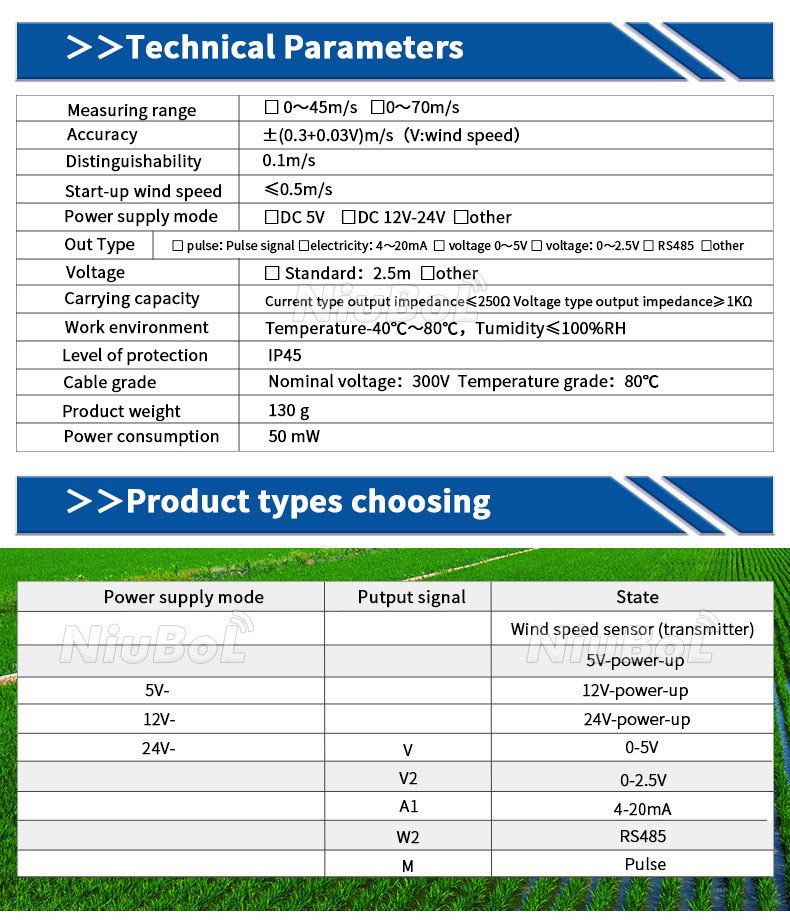

— Blogs —
—Products—
 Consumer hotline +8618073152920
Consumer hotline +8618073152920 WhatsApp:+8615367865107
Address:Room 102, District D, Houhu Industrial Park, Yuelu District, Changsha City, Hunan Province, China
Product knowledge
Time:2024-06-30 21:40:14 Popularity:435
A wind speed sensor, also known as an anemometer, is a device used to measure wind speed. They are commonly used in meteorology, environmental monitoring, aerospace, marine engineering, and agriculture. They are often used as an integral part of a weather station or weather tower to collect and record key data about the wind.
Wind Speed Sensor (Anemometer):
Wind speed sensors are used to measure the speed of the wind, i.e. the speed at which the wind flows, usually in meters per second (m/s) or knots (knots). They make measurements according to different principles and technologies, including the following common types:
Cup Anemometer:
A cup anemometer is a mechanical device used to measure wind speed. It typically consists of three or more cups mounted on horizontal arms, which rotate around a vertical axis. The cups catch the wind, causing them to spin faster as the wind speed increases. The rotation speed is then converted into wind speed measurements. Cup anemometers are robust and widely used due to their reliability and simplicity.
Hot-wire Anemometer:
A hot-wire anemometer is an electronic device that measures air velocity by means of a heated wire. The wire is heated to a constant temperature above the ambient temperature. As wind flows past the wire, it cools the wire, causing a change in its electrical resistance. By measuring this change in resistance, the instrument calculates the wind speed. Hot-wire anemometers are highly sensitive and capable of measuring very low air speeds accurately.
Ultrasonic Anemometer:
An ultrasonic anemometer uses ultrasonic sound waves to measure wind speed and direction. It typically consists of multiple pairs of transducers that emit and receive ultrasonic pulses. By measuring the time it takes for ultrasonic pulses to travel between transducers in different directions, the instrument calculates both wind speed and direction. Ultrasonic anemometers are advantageous because they have no moving parts, resulting in reduced maintenance requirements, increased durability, and high accuracy.
Each type of anemometer has its advantages and is chosen based on specific application needs such as accuracy requirements, environmental conditions, and durability considerations.
The most common unit of wind speed used internationally is: meters per second (m/s): the standard unit for measuring wind speed in the International System of Units (SI). It represents the distance that air particles move with the wind per unit of time. Where 1m /s is equal to 3.6 km/h.
In addition to meters per second, wind speed can be measured and reported in other units, such as.
- Kilometers per hour (km/h): Commonly used in daily weather reports and by the general public.
- miles per hour (mph): mainly used in countries such as the United States and the United Kingdom.
- Knot (kt): Especially in aviation and marine environments, one knot is equivalent to one nautical mile per hour. To convert between knots and meters per second, a conversion factor of 1 knot = 0.514444 meters per second can be used.

These units are interconvertible, but the meter per second (m/s) is the standard unit for scientific and meteorological purposes because it is directly related to other atmospheric parameters such as pressure and temperature.
In summary, a wind speed sensor is a device that measures the speed of air movement, and the standard unit for measuring wind speed is meters per second (m/s).
NBL-W-SS-Wind-Speed-Sensors-Instruction-Manual-V4.0.pdf
Related recommendations
Sensors & Weather Stations Catalog
Agriculture Sensors and Weather Stations Catalog-NiuBoL.pdf
Weather Stations Catalog-NiuBoL.pdf
Related products
 Combined air temperature and relative humidity sensor
Combined air temperature and relative humidity sensor Soil Moisture Temperature sensor for irrigation
Soil Moisture Temperature sensor for irrigation Soil pH sensor RS485 soil Testing instrument soil ph meter for agriculture
Soil pH sensor RS485 soil Testing instrument soil ph meter for agriculture Wind Speed sensor Output Modbus/RS485/Analog/0-5V/4-20mA
Wind Speed sensor Output Modbus/RS485/Analog/0-5V/4-20mA Tipping bucket rain gauge for weather monitoring auto rainfall sensor RS485/Outdoor/stainless steel
Tipping bucket rain gauge for weather monitoring auto rainfall sensor RS485/Outdoor/stainless steel Pyranometer Solar Radiation Sensor 4-20mA/RS485
Pyranometer Solar Radiation Sensor 4-20mA/RS485
Screenshot, WhatsApp to identify the QR code
WhatsApp number:+8615367865107
(Click on WhatsApp to copy and add friends)